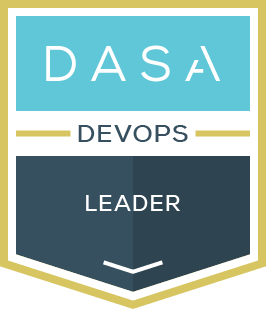In this, part one of a three-part blog, I share my 25 years of IT expertise (and some current research) that indicates new leadership skills — including training on the new IT way of working — necessary to meet the new demands of managing DevOps Teams. And this isn’t just for CIOs. Middle management has a critical role in fulfilling the promise of DevOps.
3 Part Blog
- DevOps Demands a (Re)new(ed) Kind of Leadership
- If You Want to Lead in DevOps, You Gotta Have Game
- Building DASA Competencies and DevOps Leadership Through Business Simulations
If you are a ‘flow stopper’… you could be a ‘show stopper’ for your DevOps initiatives.
Paul Wilkinson, DASA Ambassador and Learning Simulation Expert
One of the principle goals of DevOps is the smooth, fast flow of application changes from development into operations, with little waste, and with the aim of delivering business value. This continuous flow requires effective end-to-end collaboration, and we all know quite well how many IT organizations currently work in silos. Breaking down these silos and creating effective working teams is a critical enabler, and a major challenge.
Simply throwing the latest collaboration software tools into the mix isn’t the answer: fostering end-to-end collaboration demands real, hands-on leadership.
The question is:
Are you successfully leading your organizations DevOps initiative to increase flow? Or does your leadership style and structure represent a ‘flow stopper’?
Time to Revisit and Revise Leadership Capabilities
If your team’s results indicate you’re not going with the flow, or encouraging that all-important flow — you may want to revisit your leadership approach and skills. If you doubt the importance of this advice, you may wish to consider this finding from the 2017 State of DevOps report: By 2020, half of the CIOs who have not transformed their teams’ capabilities will be displaced from their organizations’ digital leadership teams.
Robert Stroud, DevOps Thought Leader and former Analyst at Forrester has also written and spoken extensively on the issue of transformational leadership — and the transformation of leaders — in fulfilling the promise of DevOps.
To unlock the promise of DevOps, CIOs must lead and support a cultural change within their technology management organization. As any leader knows, changing institutionalized behavior is the toughest of all management challenges.
Robert Stroud, DevOps Thought Leader and former Analyst at Forrester
And it isn’t just CIO’s who must lead this change. Middle managers play a critical role in empowering teams to change. I am of the same opinion.
What Key Skills are Needed to Lead in DevOps?
Whilst writing this piece I saw three articles come across my LinkedIn stream that underpin this need for renewed leadership skills and improved collaboration:
- LinkedIn: 2018 Workplace Learning Report
This report revealed
Training for soft skills is the number #1 priority
and cites Leadership, Collaboration and Communication as the top three soft skills, with Leadership as Number One. The biggest challenge facing organizations today, however, is getting employees to make time for learning. Learning new ways of working is critical to DevOps success. This requires managers to be leaders, and to foster a culture of continuous learning and improvement, and to empower individuals and teams to take time to learn. - Harvard Business Review (HBR): When Empowering Employees Works and when it Doesn’t
This report is a meta-analysis which examined the results of 105 studies. The report states
Empowering leadership can motivate employees and fuel their creativity
but goes on to addit can also create additional burdens and stress that may hurt their routine performance
. When empowering employees works well and is done effectively it seems toencourage employees to generate novel ideas and think of new ways of doing things, and to help others in the workplace
, which supports the 3 Ways of DevOps, particularly the third way of experimentation and continual learning and improvement. However empowering is a lot more than simply telling the team they are now empowered. - McKinsey: Culture for the Digital Age
This report cited
Cultural & behavioral challenges
as the most significant self-reported barrier to digital effectiveness, and statesexecutives who wait for organizational cultures to change organically will move too slowly as digital penetration grows
. The report named three critical points leaders need to focus on:risk aversion, customer focus, and silos
.
DASA Skill Sets for Transformational Leadership
The above are clear reasons for what the DevOps Agile Skills Association (DASA) labels as the core skill sets for successful DevOps: Leadership & Feedback, Team Building & Collaboration, Courage & Experimentation, and Continuous Improvement & Problem Solving. But how do you develop these crucial skill sets, effectively, in your organization?
Continue to part 2 of this blog.
Paul Wilkinson is the CEO of GamingWorks and has aligned his Phoenix Project Simulation to the DASA Team Competence Model. Find out more about the DASA training and certification programs, starting with DASA DevOps Fundamentals.
GamingWorks is a DASA Forerunner member and Paul Wilkinson is a DASA Global Ambassador. DASA Ambassadors are charged with raising the profile and awareness of DASA, the DevOps Agile Skills Association; to this end GamingWorks has conducted a series of Phoenix Project business simulation workshops around the world, based on Gene Kim’s book The Phoenix Project to show the value of simulations in supporting the DASA Team Competence Model. GamingWorks simulations help delegates translate theory into practice, and enable DevOps teams to experiment together, developing their own DevOps skills and competences.
See the Active Learning Delivering Business Value white paper showing how the Phoenix Project simulation supports the DASA Team Competence Model.


DASA DevOps Leader
Helps leaders understand leadership in the context of DevOps, discusses leadership development models, building teams, and transforming the organisation.
